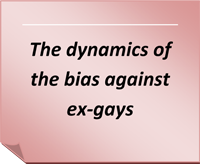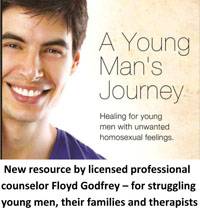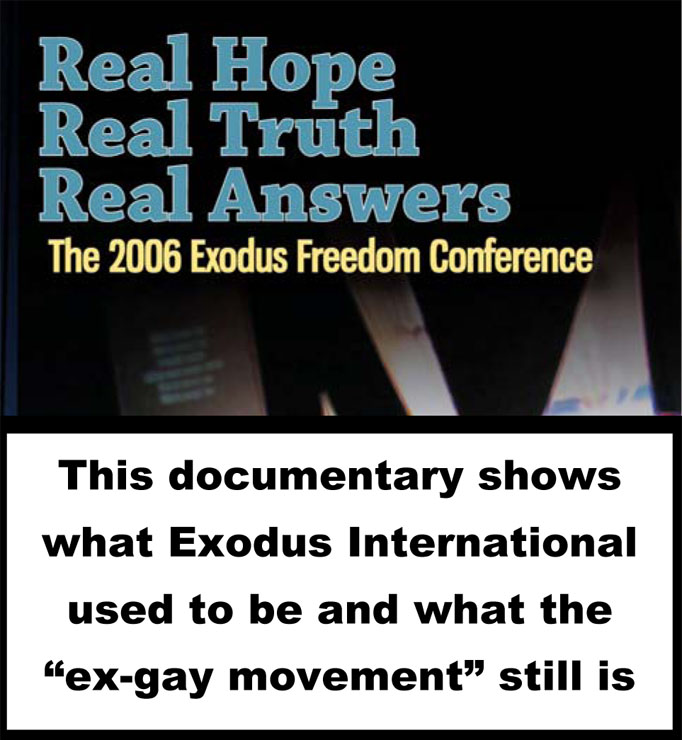Desert Stream Ministries disagrees with changes at Exodus International
July 10, 2012
The following letter is no longer on the Desert Stream Ministries website but can be found on the Americans for Truth about Homosexuality website.
Recently Desert Stream Ministries published a letter outlining foundational disagreements with Exodus International’s new grace theology, which mirrors Rev. Clark Whitten’s theology. Desert Stream Ministries also is in disagreement with Exodus International abandoning the clinical science that has helped people with unwanted same-sex attraction to change their sexual orientation in varying degrees. The letter in its entirety follows:
April 2012
Dear Friends,
Several of you have requested my views on the current Exodus debate. As far as I can see, this fundamentally involves the question about changing sexual orientation, with an underlying concern about a compromised view of grace. It also is a structural issue: who is able to do best at what for Exodus.
Please forgive our late entry into sharing our views on these matters. I (Andrew) am a weak social networker who finds the flurry of opinions disorienting, at times more flesh than Spirit. Still, we love Exodus and must take seriously the fact that Living Waters is the most commonly employed ‘healing’ format in our network.
Like you, our goal is to equip the church to offer sound ministry to the sexually broken, with an emphasis on those dealing with SSA. We will continue to do that in and through all our disagreements and adjustments. The goal is preparing a people who please Jesus, the Bride who has made herself ready.
Regarding sexual orientation change, we at DSM will continue to uphold change as a reasonable goal for Christians with SSA who are earnestly seeking Him and who are willing to do the hard work of resolving their gender disintegration through Christ and His healing community. (We realize that not all will graduate into a state of readiness for marriage. However, that should not preclude anyone from seeking full sexual restoration.)
Alan’s comments about change unwittingly played into the enemy’s hands. To question sexual orientation change on the basis of residual struggles is weak theology and psychology. Very few who have overcome destructive, life-dominating issues live without a trace of the problem. To then describe that ‘trace’ as a reason to tone down the idea of change makes no sense to us.
In a recent letter, Alan describes his own story of sexual orientation change. He was sexually oriented to men, and is now oriented around a lovely woman. A clear witness to us! We like Alan will continue to work out issues of gender integration, as we daily pick up our crosses and aspire to be what we already are: solid, whole enough gifts for others.
Gender wholeness—-the kind that truly orients us toward the good of the opposite gender and toward healthy same gender friendships-—is hard work for all human beings. We who help others take ground toward that end need not apologize. We are not overstating our case. We are simply being true to Jesus as we mature into what it means to be ‘new creations.’
Perhaps we at DSM have some disagreement with Alan on that point. He and Exodus seem unwilling at this point to overtly state that ‘the new creation’ involves reconciling with one’s true heterosexual self.
Alan states that our identities do change in Christ but does not anchor that change in a new sexual identity. We realize the caution here. A positional spiritual change does not equal the deep healing that must occur in order for one to offer him/herself to the opposite gender as a mature, authentic gift.
Still, it seems clear from Scripture and solid historic interpretation that the goal of our gender and sexual humanity is always and only toward the opposite gender. As Karl Barth said: ‘The radical sexual duality of humanity is the root of all other fellowship’; a complement to Pope John Paul ll’s words: ‘Humanity only finds itself by sincerely offering itself to the other’ [heterosexually]. St. Paul elevates that unity of man and woman to the consummation of Christ and Church. How can Exodus not make clear the goal of whole and holy heterosexual love?
We err in supporting those with SSA to jump track en route to whole heterosexual relating. We are not talking about marriage or an absence of struggle. Rather, we refer to being true to our fundamental humanity, created in God’s image and directed toward the wedding feast of the Lamb. Jesus won for us that wholeness. At the same time we become who and what at we are by picking up our crosses daily as we journey home.
What we at DSM are hearing from Exodus is a distancing itself from such categorization, using ‘holiness’ as a goal. We contend that holiness must involve squaring who we are, sexually-speaking.
That involves two-things: the realization that the ‘new creation’, justification by faith in Jesus alone, enables us to resume the journey toward whole, heterosexual relating. Secondly, as an arm of sanctification, our ministries must encourage those we serve onto becoming the gift they are in healthy same-gender friendships, and in the beautiful duality of heterosexual relating.
Please hear me; we at DSM believe in celibacy, if God gives that gift and the community confirms it. But celibacy should never be a concession to SSA, no more than marriage should be a cover-up for unresolved SSA.
These are not uncomplicated distinctions and require far more thoughtfulness and care than we have seen from Exodus. We would like to know how Exodus plans on developing a more thorough understanding of what God intends for human sexuality and its redemption.
We are unsatisfied with Exodus’ underuse of theology (the ‘new creation’ without bearing upon our bodies and their direction in the world) and needless distancing from the good of psychology in helping us to understand what is going on in our SSA and how to meet the deep needs those attractions represent.
We at DSM were concerned by the response of many Exodus leaders, including Alan, to the recent witness of a young female representing an Exodus ministry. Many of you seemed quite alright with the idea that our ministries should do little more than support celibate Christians who after 8 years of pursuing help (this woman’s example) are as passionately attracted to their own gender as ever.
We have a problem with that. (Not with the person who testified; her story was beautifully and lovingly expressed.) But not unlike Exodus itself, she references the God who apparently has little vision for her progression onto whole relating. This explains our concern over Exodus distancing itself from ‘reparative therapy.’ Alan cites Exodus’ new emphasis on ‘discipleship over therapy, holiness over sexual reorientation…’ in one letter. Why create ‘an over and against’ rather than ‘both and’? As a trained therapist, I deliberately chose to emphasize healing and discipleship groups over one-on-one therapy.
We at DSM are only indebted to the good of reparative therapy and its underpinnings in developmental psychology. How else would we understand how we become disintegrated in our gender identities, as well as gain objective markers en route to wholeness?
We cannot afford to distance ourselves from the whole healing community, which must involve solid reparative therapists. They can do what we cannot in our ministries, and vice-versa. We need them! If we were more informed and discerning as to what was going on in one’s impassioned longing for his/her own gender, the aforementioned young woman and others like her would be better served, and perhaps enabled to grow out of an 8-year impasse of desire.
We would like to know how Exodus plans on representing and integrating solid clinical insight on the Board and in its offerings.
Yet clinical help means little unless we root our healing offering in the cross of the Lord Jesus and Christ and in His community. First the Spirit opens our eyes to His burning love there, then we surrender to Christ Crucified—that repentance is our central tenet, the turning point for every movement toward wholeness. One can have access to the best resources and refuse the cross; we can know Him but yield little to Him. Jesus gave everything for us. He could give no more than what He poured out for us at Calvary. All Christians are united in that fact. Where we differ may involve how we understand surrender to Him–what it means to pick up our little crosses and follow Him daily.
That brings us to the suspicion cast upon a book, “Pure Grace,” written by Clark Whitten, who is the chairperson of the Exodus Board and pastor to Alan Chambers (Exodus president). Some Exodus members are concerned that such ‘pure grace’ will actually contaminate the offering of Exodus by making the narrow way broad and inclusive of practicing gay Christians. (Alan recently addressed such a group and referenced their common destination of heaven.)
Whitten insists that grace alone, simply received, covers and overcomes one’s sin and renders any human effort worldly, a work of the flesh. Like many Christian authors, he overstates his case, using Scripture selectively. He is convinced that the biggest problem facing Christians is legalism, heavy-handed religion that would be overcome simply by resting in what God has done for us. He also appears to believe that this is the Truth which will usher in a new reformation. Like many in his neo-Baptist, evangelical tradition, he believes in ‘once saved, always saved’, thus Alan’s belief in the possibility of heaven for practicing gays who are ‘saved’.
Whitten should be free to have his emphasis, minus the grandiosity. (A new reformation? Really?) His book could be helpful for those bound by legalism. What surprised me is how familiar I (Andrew) found the message. Over my 36 years of faith, I have read this same book, slightly modified, in the tracts and testimonies of dozens of Christians who appear to have found an easy way to live the Christian life. ‘Do nothing. Receive. Don’t strive. Rest in the finished work.’
I (Andrew) believe it and I mistrust it.
I (Andrew) know that daily I have a choice to surrender again to the Crucified. I have a healthy respect for sin and confess it daily so that it does not get the best of me. I die daily to grandiosity and am grateful for the hardships that reduce me to Him alone. Marriage is a beautiful reminder that I live not only for Jesus but also for a woman and the children we have created. And I surrender daily that I might serve others better so that we all would be ready to see Him face-to-face.
We at DSM are only grateful to not be anyone’s eternal judge. But we do not share the assurance of the Whitten camp that the sexually immoral will inherit the Kingdom of God if they have prayed the sinner’s prayer. Let God alone be the judge. We will ‘continue to work out our salvation in fear and trembling, as God works in us to will and to act according to His good purpose.’ (Phil. 2:12, 13)
We at DSM believe in grace-inspired human effort in getting free and walking free. We advocate for ourselves for all with SSA to willfully, thoughtfully wrestle with the blocks we experience in becoming whole. Receiving grace is foundational. Wholeness requires rising up and fighting and not settling for less.
We also disagree with Whitten’s presupposition that our biggest problem today is legalism. In our DSM world, be it CA or now Kansas City, the cultural norm seems to be license and entitlement. The majority of Americans today have no problem with extramarital sex, homosexual unions, or children born out of wedlock. What used to be shameful is now shameless. And the Church panders to it, using grace upon grace upon grace to placate a generation inclined to hollering ‘abuse’ if the church dares to call sinners, especially homosexual ones, to repent.
Let us give you an example. We at DSM have sought for the last 7 years to start a healing group in the most popular ‘emergent church’ in town. (Full of young hipsters…) They claimed to believe in our message, two of our best people attended there, but the church never opened the door for our ministry there.
A few months back, I (Andrew) began to engage with a man at the gym who I assumed had SSA; he seemed to be spiritually hungry and I hoped to be good news for him. He told me he had attended that church for years, and loved it. The next time we spoke, he pointed to another guy and introduced him as the new lover he had just met at the gym. When I responded that I had a history of SSA and would love to share more with him about how I handle that issue, the door slammed in my face as tightly as it had from that church.
The cultural climate has changed. The church today is guiltier of cheap grace than of heavy-handed legalism. We care more for making people feel good than helping them to become good. Exodus must be careful not to so cater to the culture that it whittles down the cross. Yes, that cross is the fount of grace, and yes, we must be called and equipped to carry that cross daily. In the words of Dietrich Bonhoeffer:
‘Cheap grace is the preaching of forgiveness without repentance, baptism without church discipline, communion without confession. Cheap grace is grace without discipleship, grace without the cross, grace without Jesus Christ, living and Incarnate…
We poured out rivers of grace without end, but the call to rigorously follow Christ was seldom heard. What happened to the church whose teaching watched so carefully over the boundary between the church and the world, over costly grace? What happened to Luther’s warnings against a proclamation of the Gospel which made people secure in their godless lives? Cheap grace was very unmerciful to our Protestant church…
Costly grace is the grace that must be sought again and again. Such grace is costly because it calls us to follow, and it is grace that calls us to follow Jesus Christ. It is costly because it costs us our life, and it is grace because it gives us the only true life. It is costly because it condemns sin, and it is grace because it justifies the sinner. Above all it is costly because it cost God the life of His Son.’
These are our recommendations:
1. That a distinction be made between Alan’s calling and job description, and the needs of the member ministries. Alan is not equipped to handle all that he is currently trying to do. We perceive him as neither a theologian nor a healer but as an inspirer and evangelist, a bridge-builder in need of refinement. He is being chastened for making unfortunate comments. God bless him; haven’t we all? We trust that those he trusts will help him to stay low and clarify the way forward for his renewed season of service.
2. In order for DSM to remain a member ministry, we need to see a higher caliber of commitment to theological and clinical excellence from Exodus. Consider the courage of those with SSA who are seeking genuine integration. They deserve the best! The stakes are high—we are all experiencing the fall-out from a few misplaced, well-intentioned words. We must all do our part, and could draw upon expert friends of Exodus, e.g. Nicolosi and Gagnon, and Exodus elders like the Worthens and Joe Dallas.
3. The process of distinguishing Alan’s role and that of the member ministries must be done slowly and carefully, with Alan playing a reduced role (at best) in the process. We would suggest team leadership here, and sensitive protocol between these newly distinguished expressions of Exodus.
4. Pray more and Facebook less. We could all repent of a little wounded self-importance. Those overcoming same-sex attraction are inclined to narcissism and its wounds. We all need to get low and give this work back to Jesus. We at DSM hesitate to follow any one person’s lead. Jesus will make such things clear as we wait together.
Respectfully,
Andrew and Annette Comiskey
Dean Greer
DSM Board of Directors:
Mike Nobrega
Morgan Davis
Cindy Del Hierro
Bill Scholl




